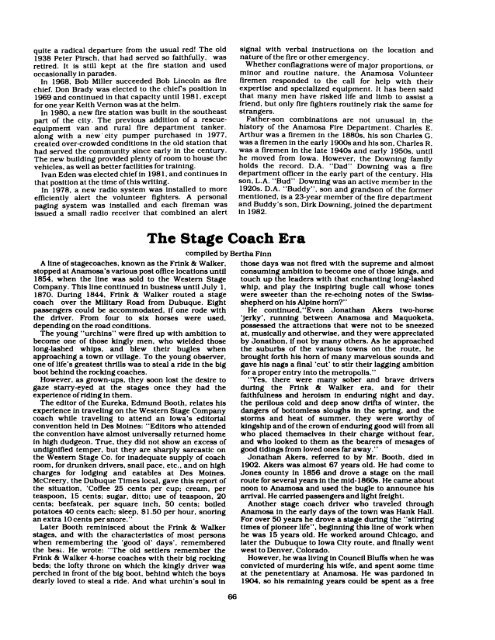Anamosa - A Reminiscence 1838 - 1988
The definitive history of the community of Anamosa, Iowa, USA
The definitive history of the community of Anamosa, Iowa, USA
Create successful ePaper yourself
Turn your PDF publications into a flip-book with our unique Google optimized e-Paper software.
quite a radical departure from the usual red! The old<br />
1938 Peter Pirsch, that had served so faithfully. was<br />
retired. It is still kept at the fire station and used<br />
occasionally in parades.<br />
In 1968, Bob Miller succeeded Bob Lincoln as fire<br />
chief. Don Brady was elected to the chiefs position in<br />
1969 and continued in that capacity until 1981, except<br />
for one year Keith Vernon was at the helm.<br />
in 1980, a new fire station was built in the southeast<br />
part of the city. The previous addition of a rescueequipment<br />
van and rural fire department tanker.<br />
along with a new'city pumper purchased in 1977.<br />
created over-crowded conditions in the old station that<br />
had served the community since early in the century.<br />
The new building provided plenty of room to house the<br />
vehicles, as well as better facilities for training.<br />
Ivan Eden was elected chief in 1981, and continues in<br />
that position at the time of this writing.<br />
In 1978, a new radio system was installed to more<br />
efficiently alert the volunteer fighters. A personal<br />
paging system was installed and each fireman was<br />
issued a small radio receiver that combined an alert<br />
signal with verbal instructions on the location and<br />
nature of the fire or other emergency.<br />
Whether conflagrations were of major proportions, or<br />
minor and routine nature, the <strong>Anamosa</strong> Volunteer<br />
firemen responded to the call for help with their<br />
expertise and specialized equipment. It has been said<br />
that many men have risked life and limb to assist a<br />
friend, but only fire fighters routinely risk the same for<br />
strangers.<br />
Father-son combinations are not unusual in the<br />
history of the <strong>Anamosa</strong> Fire Department. Charles E.<br />
Arthur was a firemen in the 1880s, his son Charles G.<br />
was a firemen in the early 1900s and his son, Charles R.<br />
was a firemen in the late 1940s and early 1950s, until<br />
he moved from Iowa. However. the Downing family<br />
holds the record. D.A. "Dad" Downing was a fire<br />
department officer in the early part of the century. His<br />
son, L.A. ‘Bud" Downing was an active member in the<br />
1920s. D.A. "Buddy", son and grandson of the former<br />
mentioned, is a 23-year member of the fire department<br />
and Buddy's son, Dirk Downing, joined the department<br />
in 1982.<br />
The Stage Coach Era<br />
compiled by Bertha Finn<br />
A line of stagecoaches, known as the Frink 81 Walker,<br />
stopped at <strong>Anamosa</strong>‘s various post office locations until<br />
1854. when the line was sold to the Western Stage<br />
Company. This line continued in business until July 1.<br />
1870. During 1844, Frink Er Walker routed a stage<br />
coach over the Military Road from Dubuque. Eight<br />
passengers could be accommodated, if one rode with<br />
the driver. From four to six horses were used,<br />
depending on the road conditions.<br />
The young “urchins” were fired up with ambition to<br />
become one of those kingly men, who wielded those<br />
long-lashed whips. and blew their bugles when<br />
approaching a town or village. To the young observer.<br />
one of life's greatest thrills was to steal a ride in the big<br />
boot behind the rocking coaches.<br />
However, as grown-ups, they soon lost the desire to<br />
gaze starry-eyed at the stages once they had the<br />
experience of riding in them.<br />
The editor of the Eureka, Edmund Booth, relates his<br />
experience in traveling on the Western Stage Company<br />
coach while traveling to attend an Iowa's editorial<br />
convention held in Des Moines: "Editors who attended<br />
the convention have almost universally returned home<br />
in high dudgeon. True, they did not show an excess of<br />
undignified temper, but they are sharply sarcastic on<br />
the Western Stage Co. for inadequate supply of coach<br />
room, for drunken drivers, snail pace, etc., and on high<br />
charges for lodging and eatables at Des Moines.<br />
McCreery, the Dubuque Times local, gave this report of<br />
the situation, ‘Coffee 25 cents per cup; cream, per<br />
teaspoon. 15 cents; sugar, ditto; use of teaspoon, 20<br />
cents: beefsteak, per square inch, 50 cents; boiled<br />
potatoes 40 cents each: sleep, $1.50 per hour, snoring<br />
an extra 10 cents per snore."<br />
Later Booth reminisced about the Frink & Walker<br />
stages, and with the characteristics of most persons<br />
when remembering the ‘good ol‘ days‘. remembered<br />
the best. He wrote: "The old settlers remember the<br />
Frink 81 Walker 4-horse coaches with their big rocking<br />
beds; the lofty throne on which the kingly driver was<br />
perched in front of the big boot, behind which the boys<br />
dearly loved to steal a ride. And what urchin's soul in<br />
those days was not fired with the supreme and almost<br />
consuming ambition to become one of those kings, and<br />
touch up the leaders with that enchanting long-lashed<br />
whip, and play the inspiring bugle call whose tones<br />
were sweeter than the re-echoing notes of the Swissshepherd<br />
on his Alpine horn?“<br />
He continued."Even Jonathan Akers two-horse<br />
‘jerky’, running between <strong>Anamosa</strong> and Maquoketa.<br />
possessed the attractions that were not to be sneezed<br />
at, musically and otherwise. and they were appreciated<br />
by Jonathon, if not by many others. As he approached<br />
the suburbs of the various towns on the route, he<br />
brought forth his hom of many marvelous sounds and<br />
gave his nags a final ‘cut’ to stir their lagging ambition<br />
for a proper entry into the metropolis."<br />
"Yes, there were many sober and brave drivers<br />
during the Frink & Walker era, and for their<br />
faithfulness and heroism in enduring night and day,<br />
the perilous cold and deep snow drifts of winter, the<br />
dangers of bottomless sloughs in the spring, and the<br />
storms and heat of summer, they were worthy of<br />
kingship and of the crown of enduring good will from all<br />
who placed themselves in their charge without fear,<br />
and who looked to them as the bearers of mesages of<br />
good tidings from loved ones far away."<br />
Jonathan Akers, referred to by Mr. Booth, died in<br />
1902. Akers was almost 67 years old. He had come to<br />
Jones county in 1856 and drove a stage on the mail<br />
route for several years in the mid- 1860s. He came about<br />
noon to <strong>Anamosa</strong> and used the bugle to announce his<br />
arrival. He carried passengers and light freight.<br />
Another stage coach driver who traveled through<br />
<strong>Anamosa</strong> in the early days of the town was Hank Hall.<br />
For over 50 years he drove a stage during the "stirring<br />
times of pioneer life“, beginning this line of work when<br />
he was 15 years old. He worked around Chicago, and<br />
later the Dubuque to Iowa City route, and finally went<br />
west to Denver, Colorado.<br />
However, he was living in Council Bluffs when he was<br />
convicted of murdering his wife, and spent some time<br />
at the penetentiary at <strong>Anamosa</strong>. He was pardoned in<br />
1904, so his remaining years could be spent as a free



